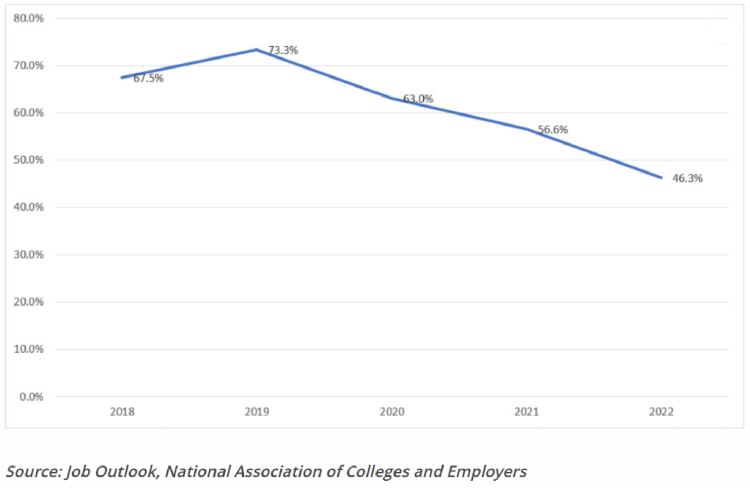Introduction
Laszlo Bock, then Senior Vice President of People Operations at Google, during an interview with The New York Times in 2013 stated: “G.P.A.’s are worthless as a criteria for hiring, and test scores are worthless…We found that they don’t predict anything.”
Seizing on this intuitive leap, many consultants are recommending companies ignore GPA.
Citing Bock, a sales consultancy advises its clients “GPA is a useless measure when it comes to hiring and using it as a hiring criteria is only hurting you, your team, and your organization.”
According to a 2022 report only 46.3% of employers use GPA to screen candidates; just five years ago, 67.5% percent used GPA to identify interview candidates. (See Figure 1.)
Figure 1: Percent of Companies Stating They Screen Candidates by GPA

Some CEOs and HR experts are starting to believe that academic performance doesn’t matter anymore. They see it as a relic—an outdated proxy for talent in today’s fast-moving, team-oriented workplaces.
But is this true?
Not according to a comprehensive 2024 meta-analysis of 114 studies conducted between 1920-2022 and using more than 47,000 data points.
The study shows that academic performance—especially when relevant to the job—is a consistent, reliable predictor of on-the-job success and employee trainability.
Study
- Sample and Sample Size: 114 independent studies covering over 47,000 individuals from studies spanning 80 years.
- Type of Study: Meta-analysis designed to calculate the association of academic performance (measured before the job outcomes) with job outcomes.
- Main Measures of Academic Performance: GPA, class rank, and professor ratings.
- Job Outcome Measures: Three workplace outcomes were studied:
- Job Performance (e.g., supervisor ratings)
- Training Performance (e.g., course grades during onboarding programs)
- Turnover (both intention and actual)
What the Study Showed
The results from the meta-analysis from 114 studies across 80-years are summarized below:
Table 1: Correlation of Academic Performance with Key Outcomes

The results lead to the following conclusions:
- Academic performance strongly correlates with job performance. Hires with higher GPA perform better based on multiple metrics like supervisor ratings, sales outcomes, helping behavior, production records, and peer ratings.
- Those with higher academic performance have higher training performance—rankings, ratings, instructor evaluations, and so forth. They are more trainable, in other words.
- It has no relationship with actual turnover. Hiring employees with better grades does not put you at risk of having higher turnover—not only do they perform better but have equivalent retention rates as those with poor academic performance (and work performance)
- Moreover,
- Graduate-level academic performance is the strongest predictor of job success.
- Job-relevant academic measures (e.g., practicum performance) yield much higher correlations (up to 0.40).
- Self-reported GPAs are less predictive than official transcripts.
- “Measures that assess academic performance in major-specific or job-relevant courses can predict job performance with correlations in the .30s and .40s,” say the authors.
Key Takeaways for CEOs
- Don’t Dismiss GPA: Grades, especially when tied to job-relevant coursework or hands-on practicum, are a strong signal of future job and training performance.
- Hiring Smart Employees Doesn’t Increase Turnover: High GPA doesn’t predict whether someone will stay or leave. Academic excellence doesn’t increase attrition—by focusing on academic performance as a hiring criterion, you can get great employees who will stay.
- Use the Right Type of Academic Performance Data: Professor evaluations and official transcripts are more reliable than self-reports or raw GPA across majors. Ask for them!
- Make It Job-Relevant: Academic performance in behavioral or practicum-based coursework (e.g., clinical rotations, teaching internships) is especially predictive of future job success.
The next time someone tells you GPA doesn’t matter, ask them: “what’s your evidence?”
If their entire claim is based on a few unsubstantiated quotes from executives, don’t bet your company’s talent management practice on it. Because 47,000 data points, from more than 114 studies conducted over 80 years, say otherwise.
Citation
Van Iddekinge, Chad H., Arnold, John D., Krivacek, Sara J., Frieder, Rachel E., & Roth, Philip L. (2024). Making the Grade? A Meta-Analysis of Academic Performance as a Predictor of Work Performance and Turnover, Journal of Applied Psychology, 109(12), 1972–1993. https://doi.org/10.1037/apl0001212​.
